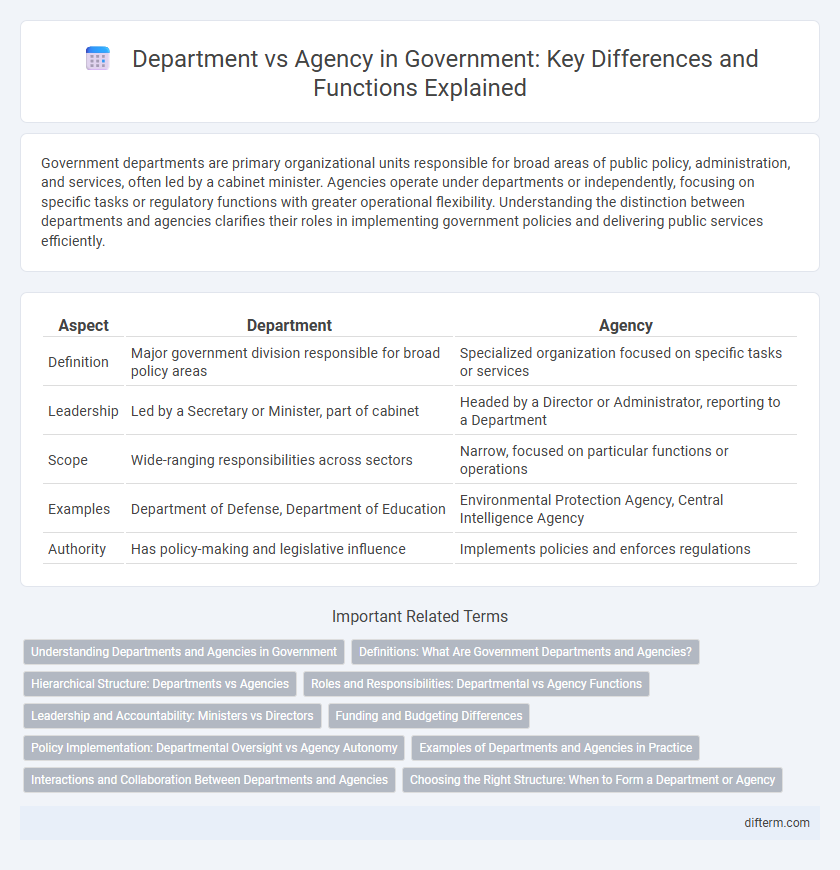Government departments are primary organizational units responsible for broad areas of public policy, administration, and services, often led by a cabinet minister. Agencies operate under departments or independently, focusing on specific tasks or regulatory functions with greater operational flexibility. Understanding the distinction between departments and agencies clarifies their roles in implementing government policies and delivering public services efficiently.
Table of Comparison
| Aspect | Department | Agency |
|---|---|---|
| Definition | Major government division responsible for broad policy areas | Specialized organization focused on specific tasks or services |
| Leadership | Led by a Secretary or Minister, part of cabinet | Headed by a Director or Administrator, reporting to a Department |
| Scope | Wide-ranging responsibilities across sectors | Narrow, focused on particular functions or operations |
| Examples | Department of Defense, Department of Education | Environmental Protection Agency, Central Intelligence Agency |
| Authority | Has policy-making and legislative influence | Implements policies and enforces regulations |
Understanding Departments and Agencies in Government
Government departments are primary administrative units responsible for broad policy areas, often led by cabinet ministers and directly accountable to the executive branch. Agencies function as specialized entities within or outside these departments, focusing on specific tasks, regulatory enforcement, or service delivery with greater operational autonomy. Understanding the distinction involves recognizing that departments shape overarching governance strategies, while agencies implement targeted programs and regulations.
Definitions: What Are Government Departments and Agencies?
Government departments are primary administrative units responsible for specific policy areas and public services, typically led by a minister or secretary. Agencies operate under departments as specialized entities tasked with implementing laws, regulations, or programs within narrower functions. Both departments and agencies play integral roles in executing government functions, with departments setting broad strategies and agencies focusing on operational details.
Hierarchical Structure: Departments vs Agencies
Departments represent the highest level in the government's hierarchical structure, typically overseeing broad policy areas and often headed by a cabinet member. Agencies operate under departments as more specialized entities tasked with specific regulatory, administrative, or enforcement functions within the broader departmental mandate. This hierarchical dynamic ensures clear lines of authority and accountability, with departments providing strategic direction and agencies executing detailed operational responsibilities.
Roles and Responsibilities: Departmental vs Agency Functions
Government departments primarily develop and implement broad public policies, overseeing multiple related functions across various sectors, while agencies focus on specialized administrative tasks and enforcement of specific regulations. Departments manage budgeting, legislative coordination, and strategic planning, providing a framework for agencies to execute operational activities. Agencies operate under departmental guidance but possess greater flexibility in day-to-day procedural functions and program delivery.
Leadership and Accountability: Ministers vs Directors
Government departments are typically led by ministers who hold political accountability and set broad policy directions, while agencies operate under directors focused on operational management and specialized service delivery. Ministers are responsible for overall governance, public accountability, and aligning the department's objectives with government priorities. Directors, appointed based on expertise, ensure efficient agency performance and compliance within the framework established by ministerial leadership.
Funding and Budgeting Differences
Departments operate under direct government control with annual budgets approved through legislative processes, allowing for more centralized and predictable funding allocations. Agencies often receive their funding through both government appropriations and external revenue streams, granting them greater financial flexibility but variable budget stability. This distinction impacts how each entity plans expenditures and manages resources within public sector financial frameworks.
Policy Implementation: Departmental Oversight vs Agency Autonomy
Government departments exercise direct oversight over policy implementation by establishing guidelines, allocating resources, and monitoring progress to ensure alignment with legislative mandates. Agencies operate with a higher degree of autonomy, enabling flexible and specialized execution of policies, often adapting strategies to real-time operational challenges. This distinction balances hierarchical control with operational independence, optimizing both accountability and efficiency in public administration.
Examples of Departments and Agencies in Practice
The Department of Defense oversees the military branches and manages national security policies, exemplifying a federal department with broad regulatory powers. The Environmental Protection Agency enforces environmental laws and conducts research, illustrating an agency focused on specific operational mandates. State-level departments like the California Department of Transportation handle infrastructure planning, whereas agencies such as the New York State Office of Parks administer park services, highlighting the distinction in scope and function.
Interactions and Collaboration Between Departments and Agencies
Departments and agencies collaborate through structured communication channels to ensure efficient policy implementation and service delivery. Regular interdepartmental meetings and joint task forces facilitate information sharing and coordinated responses to public needs. This collaboration enhances resource optimization and improves overall government accountability.
Choosing the Right Structure: When to Form a Department or Agency
Choosing the right government structure depends on scope and function; departments typically handle broad policy areas under direct ministerial control, ensuring centralized oversight and resource allocation. Agencies focus on specialized tasks or regulatory functions, offering operational flexibility and expertise in distinct domains like environmental protection or public health. Evaluating long-term goals, jurisdictional reach, and required autonomy guides the decision between establishing a department or agency for effective governance.
department vs agency Infographic

 difterm.com
difterm.com